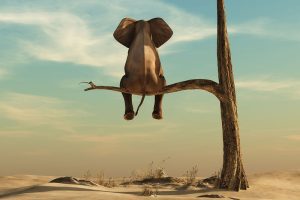 "It is no exaggeration to say that what happens in the next five years will determine the future of life on Earth.
"It is no exaggeration to say that what happens in the next five years will determine the future of life on Earth.
We have five years to place the world on a sustainable trajectory before negative feedbacks of combined nature degradation and climate change place us on the downhill slope of runaway tipping points.
The risk of failure is real – and the consequences almost unthinkable. All of us – governments, companies, organizations, individuals – need to walk the walk, and be ready to hold to account those who fail to do so....We have just one living planet".
There are not only ecological costs, but socio-economic ones:
Imagine this 'wild' truth documented in the Report:
Economically speaking, over half of the global GDP (55%) – or an estimated US$58 trillion – is moderately or highly dependent on nature and its services. Yet our current economic system values nature at close to zero, driving unsustainable natural resource exploitation, environmental degradation and climate change."
There are costs to our health:
Our current system is killing us!
The problem is, we’re now too good at changing our environment to suit us. We chop down forests, fish out entire seas, pump huge quantities of pollutants and chemicals into the system. We undermine the life support system on which we rely.
We live on a planet with finite boundaries as if there is no tomorrow....really no tomorrow!
The earth is sending bigger and bigger bills, like droughts, floods, and heat waves, and are causing serious economic costs: "The latest scientific update shows a 19% loss of GDP by 2050 if we follow the current path. This is equivalent to 38 trillion US dollar of loss per year in 2050. It’s starting to hurt..."

Nonetheless, we continue to deny that there are problems. Here are some arguments:
There is ample evidence that citizens across the world care about nature & climate.
"They are concerned, they want solutions. (...) We have also so much evidence that the solutions are not only available, but if we implement them, we get a more healthy, stable, secure future with jobs and economies that can compete and provide livelihoods into the future." https://lnkd.in/dVFpgV8w Status report of the systems collapse"
We cannot change anything unless we recognise and accept where we are at.
Like a simmering pot with its lid rattling, it is only a matter of time before there is no tomorrow, not for us, not for our future generations.
For the status quo of earth boundaries and tipping points, read the Snapshot of the Present.
So where from here?
It seems our collective challenge is to find ways to align with the intelligence of life.
Think of Biomimicry - learning from and mimicing the strategies used by living organisms to solve challenges comparable to the ones we face as individuals and societies.
"The benefit is that nature presents us with many strategies far better at working harmoniously with the rest of nature than many human developed strategies have been. The goal then is to create products, processes, and systems that solve our greatest design challenges sustainably and in harmony with all life on earth."
We have technologies, which can and are part of the solutions, but what we don't have is a functional, life-aligned intelligence.
 However, our thought patterns remain in a colonist mentality, and we still believe in the superiority of human beings over our life support system.
However, our thought patterns remain in a colonist mentality, and we still believe in the superiority of human beings over our life support system.
Dana Meadows identified ‘leverage points’ for changing human systems, from tweaking parameters to rewriting major rules. Number 12 on her list – with greatest potential leverage but most difficult – was to transcend the prevailing system to see it for what it was and reject it for something new.
"We cannot solve our problems with the same thinking we used when we created them.” – Albert Einstein
Nate Hagens interviewed one of the great systems thinkers, physicist and deep ecologist Fritjof Capra, to explore how this understanding of solutions through a systems approach has been shaped by his decades of work in physics, ecology, and community development–and his conclusions that addressing our ecological and social crises will require a broader shift in our values and philosophies. https://www.thegreatsimplification.com/episode/138-fritjof-capra
"Without a systems lens, the full reality of the human predicament will never be understood. It is only when we adopt this kind of holistic, wide-boundary thinking that we can see the complexity and nuance of how the biosphere, geopolitics, economics, energy, and many other systems interplay with and influence one another." Fritjof Capra

© Copyright 2024 1Earth P/L ta Lifeforce Matrix